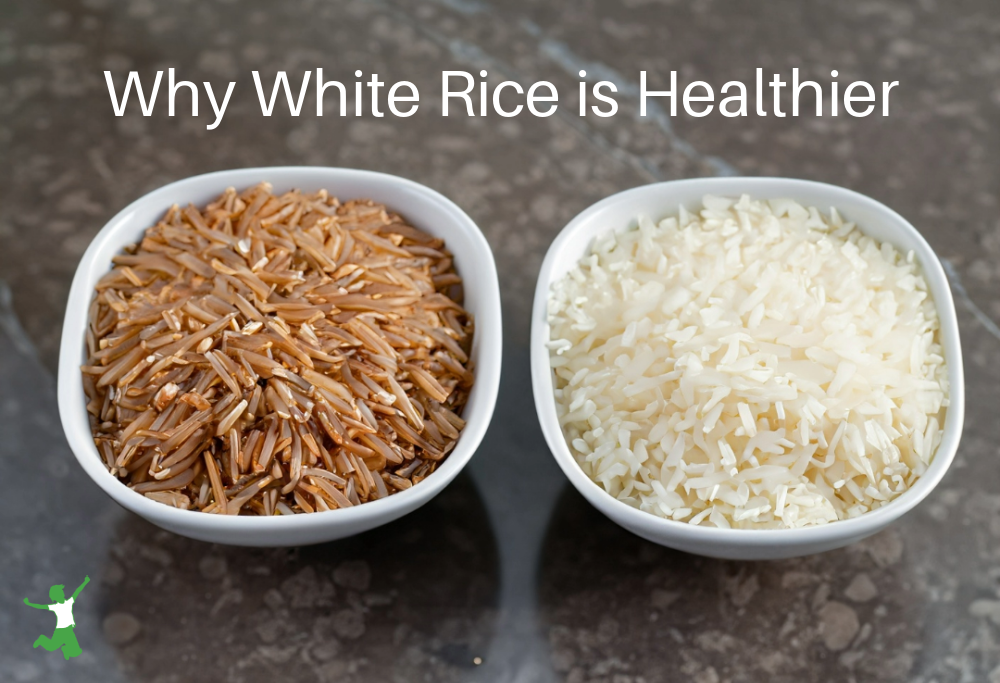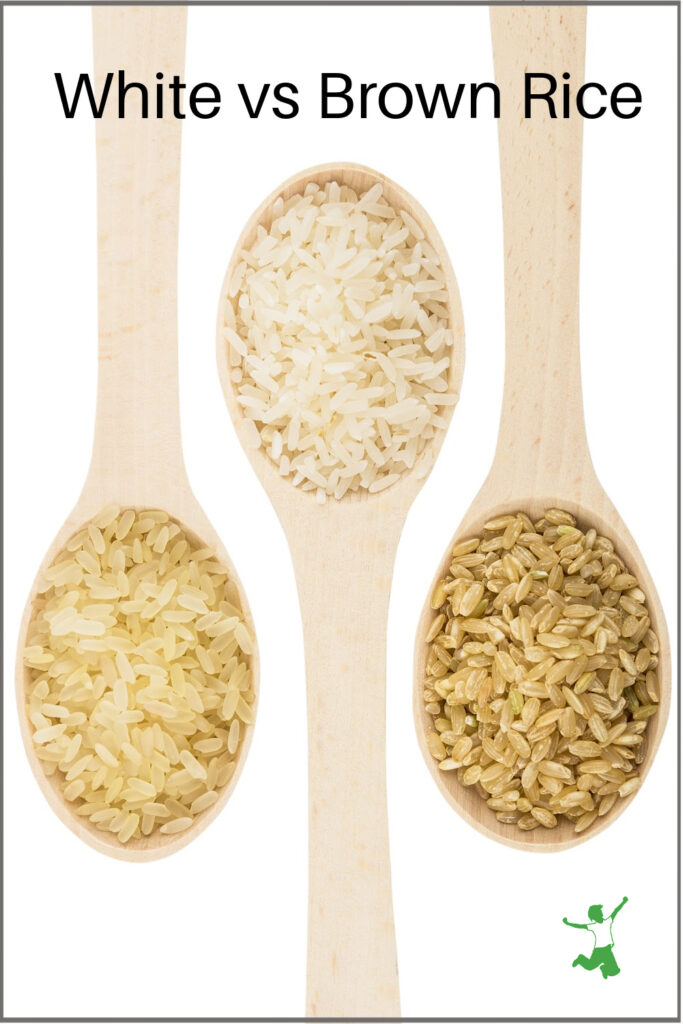The reasons white rice is healthier than brown rice as determined by research as well as which type traditional societies preferred consuming.

My article and video on healthy Chinese food drew some comments from readers who questioned my choice of rice.
Why was I using white rice vs brown? Isn’t brown rice the healthier choice, after all?
Ok, I’ll spill the beans, rice. Here are my reasons …
The truth is, neither my husband nor myself have ever enjoyed brown rice (although we love the nutty flavor and digestibility of wild rice).
Every time we eat brown, it just seems to not sit very well in our stomachs.
Even when it is sprouted or soaked before cooking, it, well, uh, sits like a brick for lack of a better word.
Why Some People Should Eat White Rice
White rice just seems to digest a whole lot better for us. That to me was reason enough to choose it over the brown rice.
We were also advised by an Ayurvedic MD back in the 1990s to stick with white basmati rice. This recommendation clinched the decision.
You are what you digest, after all – not necessarily what you eat!
End of story? Well, not quite.
Rice Fiber in Brown Harms a Compromised Gut
A few years back at the annual Wise Traditions Conference, I became familiar with a compelling book called Fiber Menace.
The author writes extensively about the dangers of a high-fiber diet as it pertains to a menu loaded with whole grains as pushed by the misguided Food Pyramid.
In other words, folks who eat a bowl of All Bran every morning to keep the bathroom visits regular are unknowingly ripping their insides to shreds.
The basic premise of Fiber Menace is that grain fiber plays a leading role in many gut-related ailments including colon cancer.
When I first learned of this information, my preference for white rice over brown rice started to make more sense.
Perhaps the brown rice didn’t digest that well because of all that fiber?
Chalk one up for the white rice.
White Rice Far Lower in Phytic Acid
A second piece of information came from author Ramiel Nagel.
In his book, Cure Tooth Decay, he writes about the devastating effects of phytic acid in the diet. Phytic acid is a very powerful antinutrient and blocker of mineral absorption in the gut.
Mr. Nagel identifies brown rice as very high in phytic acid.
What’s more, soaking brown rice does not reduce phytic acid by much at all!
Polished Rice is the Ancestral Form
Ramiel also maintains that the traditional method for preparing brown rice is never to eat it whole (with only the husk removed).
Rather, ancestral societies pounded brown rice in a mortar and pestle to polish it by removing the outer bran layer. This is the primary source of the phytic acid.
Nagel goes on to point out that experiments have shown that the milled and polished rice that results from this pounding process, has the highest mineral absorption.
In short, mineral absorption from whole brown rice is much less than white polished rice. This is because the phytic acid in the bran which is not reduced much by soaking, greatly interferes with the absorption process.
What About Arsenic?
A big issue with arsenic contamination in rice has emerged in recent years. Some folks have responded by no longer eating rice at all.
This is an overreaction, in my view.
Clean rice is definitely available if you know what to look for.
This article on how to avoid arsenic in rice details what to do. While soaking brown rice barely moves the needle on phytic acid, soaking white rice before cooking removes nearly all the arsenic!
Another option is to parboil white rice before using fresh water for a full cook if you don’t have time to soak.
Is White Rice Better Than Brown?
So it seems that brown rice is not necessarily a healthier choice than milled white rice.
Black or red rice would fall into the same category.
Obviously, whether you choose one or the other is a personal preference, but I hope this information helps you sort through the decision with a bit more clarity.
As for me and my family, we will be sticking with white basmati and jasmine rice (white basmati rice is more nutritious than plain white rice).
I currently buy this brand of rice in 25-pound bags as the most economical and high-quality choice.
Observation clued me in many years ago that brown rice was not something that was sitting well in my stomach or my husband’s.
As the years go by, more research is coming forth to indicate that this decision was the right way to go after all.
Do you eat white rice or brown rice in your home? Why or why not?

References
(1) Fiber Menace
(2) Living with Phytic Acid
More Information
Macrobiotic Diet and Extreme Vitamin D Deficiency
Tiny Teff Grains Deliver Big on Nutrition
How to Make Perfect Yellow Rice (Arroz Amarillo)
Millet: Healthy or Not?
Do Whole Grains Cause Cavities?








What an informative post! I always like to find out what is healthy to feed my family as we are trying to avoid doctor visits via healthy dieting. I grew up with long grain Jasmine white rice and it was hard to switch to brown rice (thought and heard it was healthier). I tried and gave up. After reading your post I remember only "poor people" eat brown rice from our culture as they are not refined (now I know it is also hard for the digestiv system, thanks to you). And we only soaked short grain rice overnight to improve the cooking of that type of rice.
Sarah,
My husband will love it if we switch back to white rice. !! Have you seen this method of preparing brown rice: http://www.kitchenstewardship.com/2010/04/01/phytic-acid-in-rice-reduced-96-with-accelerated-fermentation/
It's interesting! I'd love to know if it changes anyone's "sitting with them" for those who aren't digging the brown rice.
🙂 Katie
We eat both brown and basmati rice, but I often "doctor" the white rice by cooking it in chicken broth and adding lots of butter to it! Actually, I do that to the brown rice, too 🙂
Interesting. I eat organic brown basmati rice from our family farm in Arkansas. I have never like white rice, even as a child. I felt like it created a kind of "glue" in my mouth as I chewed it. I'll have to try the jasmine rice soon and see if that's better to me. My family might like it better as well…I've never given them options when it comes to rice because I've always believed brown rice compared to white rice like whole grain flours compared to white.
Yes, a prolonged soaking with a starter medium like whey or lemon juice would reduce the phytates. 24 hours would be a good timeframe. Soaking with plain water doesn't do much though.
Wow, I love learning new things. I prefer the taste of brown rice but one of my boys always wants white basmati rice(Grandma has that kind). It never occurred to me that it may b/c he digests it better. After a severe reactions to MMR and subsequent GI/bowel issues, his digestive health is so important. I guess from now on I will be making two kinds of rice. Thank you for the book recommendations.
p.s. we know longer vaccinate, mommy wasn't so educated when her boys were little:(
So If not grains, what would a person eat for breakfast if not cereal? just wondering.
Eggs, bacon, kefir or yogurt smoothies are a few favorites at our house. Coconut flour pancakes are really awesome too.
Thanks so much, Sarah, will try coconut flour, I love the coconut oil too.
Welshire Farms turkey bacon, french toast made from sprouted bread, lotsa butter, cinnamon, maple syrup, free-range eggs. Raw milk. Yum
Saute`d veggies (organic of course) and oven-baked potatos, served with a pastured egg on top, all cooked in plenty of your choice of traditional fat, such as olive oil, coconut oil, bacon fat, or BUTTER! 😀
This is what we had for breakfast this morning. 😉
Hi Sarah, what about soaking the rice with something like lemon juice for a time to help the abosorption of minerals? Wouldn't that make a difference? We've started soaking to help cut down the cooking time and my next step is to soak with something like lemon juice or rejuvalac
We've been eating brown rice for years, not sure what its doing to our bodies. Praise the LORD, we are healthy, and stay away from doctors.
I'd love to hear what you have to stay about soaking. I'm currently taking the GNOWFLINS ecourse which is talking about the benefits of soaking grains.
blessings
carmen
I don't mind brown rice and none of us have trouble digesting it (as far as we know anyway), but I'll bet my family would love it if I served white rice again. We have been mostly eating Japanese germinated brown rice, which is a sprouted rice, maybe that's why it sets well with us… (Here's my post where I talk more about it:
It's always so interesting when you find out something you thought was "bad" is actually OK, as in this case or GOOD for you, like BUTTER! 🙂
Kelly
I've been a brown rice lover for at least 35 years since my dad was very fond of it and I guess it carried over to me. But I like all kinds of rice depending on the cuisine. We like Thai food quite a bit and it really needs the sticky white stuff. I have had to cut way back on all grains though as the older I get the more picky my body has become about what I put in it.
Hi Kelly, thank you for that fantastic suggestion! I didn't know that sprouted brown rice was available! I'm sure that would work very well as a modification for folks who really prefer the more robust flavor of brown rice over white .. the sprouting would go a very long way to eliminating the phytic acid problem in the bran and make it much more digestible for sure.